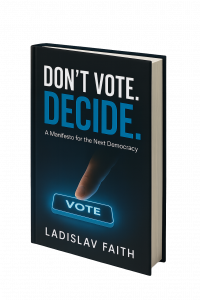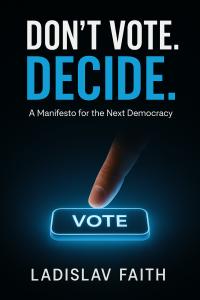The Beginning of the End for Political Parties: How AI Could Turn Voting into Deciding
Documentary filmmaker Ladislav Faith outlines a model where citizens vote in an app and AI executes their will.
NEW YORK, NY, UNITED STATES, November 3, 2025 /EINPresswire.com/ -- A new book by documentary filmmaker and writer Ladislav Faith argues that artificial intelligence will not replace democracy — it will replace political parties.
In his newly released 140-page manifesto DON’T VOTE. DECIDE., available exclusively on Amazon, Faith outlines how technology could dissolve the centuries-old structure of representation and create a world where citizens decide directly, and algorithms guarantee that their collective will is executed with precision, transparency, and trust.
For Faith, the question is not whether machines will govern, but whether people will finally stop waiting for permission to decide.
“AI is not meant to govern. It’s meant to serve.”
(Chapter 6 – Artificial Intelligence as a Civil Servant)
The book envisions a near-future democracy where every citizen has a secure digital identity and a direct voice in public decisions. Instead of electing parties and waiting years for promises to turn into policy, people would vote on concrete proposals — education, budget priorities, environmental projects — and AI systems would verify, execute, and audit the outcomes in real time.
Faith compares today’s democracies to obsolete software — systems built for a world that moved at the speed of a horse-drawn carriage. He argues that the real weakness of modern governance is not corruption or ideology, but latency — the time gap between collective awareness and collective action.
“Political parties aren’t evil. They’re just software that forgot to update.”
(Chapter 3 – Political Parties: A Temporary Fix That Rusted)
That “software,” he writes, once made sense: when messages traveled by mail and parliaments were the only bandwidth society had. But in a world where information spreads in seconds, people can now co-govern as easily as they communicate — without intermediaries, lobbies, or party logos.
Faith predicts that within two decades, political parties may disappear altogether, replaced by open, data-driven systems of collaborative decision-making. Instead of ideologies competing for votes, AI would enable verified transparency: showing how every public unit spends funds, how results compare to costs, and what impact each decision creates in real time.
This vision is not rule by machines — it’s rule by results.
Faith portrays AI as a new kind of civil infrastructure — a “conscience accountant” that checks waste, optimizes resources, and monitors fairness continuously. It’s a world where citizens no longer delegate power for four years but participate daily in decisions that shape their communities.
He draws historical parallels from Athens to Rome to the digital era: every system that centralized power eventually collapsed under its own inertia. The next update, he says, won’t come through revolution but through architecture — through designing a system where citizens become co-authors of policy rather than its audience.
“Modern democracies still run on the operating systems of the 19th century,” Faith explains. “People live in real time, but they still vote in intervals. Data updates daily; laws don’t.”
The book shows how AI could help governments learn as fast as the societies they serve. Algorithms that optimize medicine, logistics, and energy could also optimize policy implementation — not by dictating values, but by making outcomes measurable and reversible.
Faith insists that technology alone will not fix democracy — only people can. But for the first time in history, they have the tools to make that happen. Phones are the new ballots, and data is the new constitution.
DON’T VOTE. DECIDE. is both a warning and a blueprint: a vision of a world where governments become interfaces, politics becomes operations, and citizens become the real executive branch.
About the Author
Ladislav Faith is a documentary filmmaker and writer focused on the intersection of technology, power, and social evolution. His previous works explore how information systems reshape governance and culture. DON’T VOTE. DECIDE. is his first English-language book and forms part of a broader project on the future of decision-making in the AI era.
Review copies and interviews with the author are available upon request.
Links
Website: https://dontvotedecide.com
X (Twitter): https://x.com/LadislavFaith
Amazon: https://www.amazon.com/dp/B0FXJB9Q75
Media Contact:
Ladislav Faith
ladislavfaith@dontvotedecide.com
https://dontvotedecide.com
Ladislav Faith
Faith Productions | Author of DON’T VOTE. DECIDE.
ladislavfaith@dontvotedecide.com
Visit us on social media:
Facebook
X
Other
DON’T VOTE. DECIDE. — The Manifest (Official Short Film)
Legal Disclaimer:
EIN Presswire provides this news content "as is" without warranty of any kind. We do not accept any responsibility or liability for the accuracy, content, images, videos, licenses, completeness, legality, or reliability of the information contained in this article. If you have any complaints or copyright issues related to this article, kindly contact the author above.



